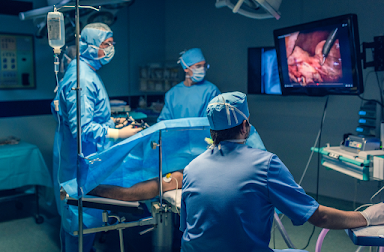In the modern medicine era, the advancement of surgical techniques has paved the way for less invasive procedures, offering patients quicker recoveries, shorter hospital stays, and minimal scarring. Two prominent innovations that have redefined the surgical landscape are laparoscopic surgery and robotic surgery. Both methods are considered minimally invasive, but they differ significantly in terms of technology, approach, and application. In this article, we will delve into the distinctions between laparoscopic surgery in jabalpur and robotic surgery, shedding light on their unique characteristics and benefits.
Laparoscopic Surgery: A Surgical Revolution:
Laparoscopic surgery, also known as minimally invasive surgery (MIS), has been in practice since the late 20th century. In this technique, a surgeon makes small incisions (usually 0.5 to 1.5 centimeters) in the patient's abdomen, through which a laparoscope (a thin, long tube with a camera and light source) and specialized surgical instruments are inserted. The laparoscopic surgeon in jabalpur then navigates through these small incisions to perform the procedure.
Key Features of
Laparoscopic Surgery:
Surgeon's Instructions: Laparoscopic hernia surgery in jabalpur relies
on the hernia surgeon in jabalpur operating
the instruments directly, giving him or her direct control over the procedure.
Surgical Instruments: Specialized instruments are used,
guided by the surgeon's skill and experience.
Limited Range of Motion: The surgeon's hands have a limited range of motion, which can make complicated surgery difficult.
Robotic
Surgery: Precision Meets Technology:
Robotic surgery represents the latest evolution in minimally invasive surgical techniques. The implementation of a robotic surgical system, such as the da Vinci Surgical System, is essential. This system comprises robotic arms, a high-definition camera, and specialized surgical instruments. The best laparoscopic surgeon in jabalpur sits at a console and controls the robotic arms, which mimic their hand movements with precision and accuracy.
Key Characteristics
of Robotic Surgery:
Enhanced Precision: Robotic surgery offers unparalleled
precision and stability as the robotic arms can move with greater dexterity and
a wider range of motion than the human hand.
3D Visualization: Surgeons are provided with 3D,
high-definition visuals of the surgical site, improving depth perception and
visibility.
Surgeon's Console: The surgeon controls the robotic arms
remotely from a control panel, changing their hand movements into precise
motions by the robotic tools.
Differences and Comparative Analysis
|
S.NO |
BASIS |
Laparoscopic
Surgery |
Robotic
Surgery |
|
1. |
Control Mechanism |
Direct manipulation by the surgeon. |
Robotic surgery involves the use of a computer to control robotic
arms. |
|
2. |
Range of Motion |
Limited by the surgeon's physical abilities. |
Robotic surgery provides a broader range of motion and flexibility. |
|
3. |
Precision |
Precision depends on the surgeon's experience. |
Enhanced precision due to robotic stability. |
|
4. |
Visualization |
Provides 2D visuals. |
Offers 3D, high-definition visuals. |
|
5. |
Learning Curve |
Requires significant training and experience. |
Also requires training but may have a shorter learning curve for some
surgeons. |
Conclusion:
Laparoscopic surgery and robotic surgery are both remarkable advancements in the field of surgery, offering patients less invasive options with quicker recovery times and reduced postoperative pain. The choice between these two techniques often depends on the specific procedure, the surgeon's expertise, and the patient's unique circumstances. While laparoscopic gallbladder stone surgery in jabalpur relies on the surgeon's manual dexterity and experience, robotic surgery introduces a robotic system that enhances precision and provides better visualization.
As these technologies continue to evolve, the future of
surgery may involve a blend of human expertise and robotic precision, promising
improved patient outcomes and expanded possibilities for minimally invasive
procedures. In the end, patients must consult with their healthcare providers
to determine the most suitable approach for their medical condition.






